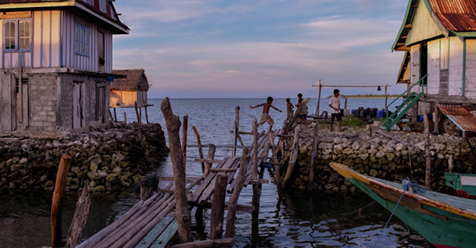Spearfishing in Indonesia
By: Emily Zislis, CAS ’21

Emily wrote this vivid account of a day with a family of Bajau fishermen in Indonesia. It originally appeared on the Where There Be Dragons “Yak Board” in 2016.
This morning we were awoken in our separate houses before the sun broke the horizon. Between the yelling, incessant roosters crowing, and the feeling of bamboo strips spontaneously springing up beneath us as people walked around the rickety house, it was impossible to stay asleep for long. Last night Annika’s host dad, Pak Jaruning, had invited us to join him spearfishing, so we met at around six on his little section of the dock where the boat was tethered. We watched in awe as Pak Jaruning effortlessly leaped into the boat as though he were greeting an old friend. The boat precipitously swayed in the oily, sewage-filled muck below, and we were grateful that Annika’s host mom, Bu Apusia, stood firmly perched on the bow of the boat, steadying it with a long bamboo stick. We awkwardly clambered into the dugout canoe, which was a collision of traditional, simple structure and a rugged attempt at modern technology. Selsia, Annika’s host sister, passed her infant nephew (not much younger than she) down the ladder to her mother. After she leapt into the boat, we set off.
As we paddled away from the village, we watched bottles, wrappers, dead animals, fish bones, and feces float by. Once out of the shallow, exposed, lifeless coral flats, the sea grew deep enough for Pak Jaruning to hand-start the motor. It grumbled to a shaky start, spewing black smoke that burned our lungs and briefly obscured our vision. We spent the next 45 minutes rocking through the placid, murky, ocean water. At first we attempted to shout over the machine gun rattle of the motor, but then resigned to its rhythmic sputtering that drowned out all other noise.
We finally reached the waters surrounding Hoga, a nearby island, where the stunning, polychromatic coral gardens plunged downwards into the depths as quickly as they began. The boat slowing, Bu Apusia dropped a makeshift anchor, once part of an engine, into the clear waters below. As Pak Jaruning put on his hand-carved, wood and glass goggles, we reluctantly retrieved our ‘space masks’ (Western-styled snorkel equipment). The three of us jumped into the warm water, leaving Bu Apusia to care for her daughter and grandchild in the boat.
We spent the next two hours attempting to keep up with Pak Jaruning as he glided through the water, a stealthy hunter careful not to startle the fish. Years of practice allowed him to distinguish between the protected fish and the fish that his wife would be able to legally sell at the market on the neighboring island of Kaledupa. Once he identified a target, he would dive down about a dozen meters and wait for the perfect moment to pull the trigger on his spear gun. Each spear sent piercing through the water created an audible whirr, followed by the sound of a fish wildly thrashing to break free. We marveled at the steadily increasing string of multicolored fish dragged behind Pak Jaruning. We could do little to contribute to his effort, yet we did retrieve some of his catches and swim them back to the boat, one hand tightly grasping the still twitching, slimy fish, the other vigorously battling the strong current.
When Pak Jaruning decided we had caught enough fish for the day, we returned to the tilting, crooked patchwork of wooden planks and bamboo walls of Sampela. As we neared the village, we were brought back to reality, where plastic pokes out of the sea like an infectious disease that can’t be shaken. Coming in at low tide, we scraped and bumped along the dead coral covered in barely 6 inches of water. Bu Apusia paddled us through sludge covered sea grass, piles of sea urchins, and Halloween colored starfish. Eventually we reached the rest of Annika’s host family, who awaited our return with coolers and buckets in hand. Sunburned, salted, and smelling of fish, we yet again struggled to remain upright as we haphazardly disembarked after the family.
This morning gave us a snapshot of a day in the life of the Bajau people. Although we were initially appalled to discover that we were fishing in a protected zone, Bajau people have a culture of subsistence, and therefore don’t take the long-term effects of overfishing a reef into consideration. After all, they have historically led a nomadic life and are therefore conditioned to moving on to a new reef once the resources of the old have run dry. Many blame the Bajau for environmental destruction, especially denizens from the neighboring island of Kalidupa. Nonetheless, the problem is much larger than the Bajau; it is a systematic problem perpetuated by the same people who point fingers at Sampelans, as they, too, benefit from the fish that the Bajau catch each day. Whether it’s selling them to Kalidupans or exporting them foreign markets, we are all part of the issue.
Each year there is a number of Penn students that choose to take a gap year, whether as admitted high school seniors prior to matriculating, or between years at Penn. They pursue passions and interests, gain work experience, travel, nurture relationships with family and friends, and more.